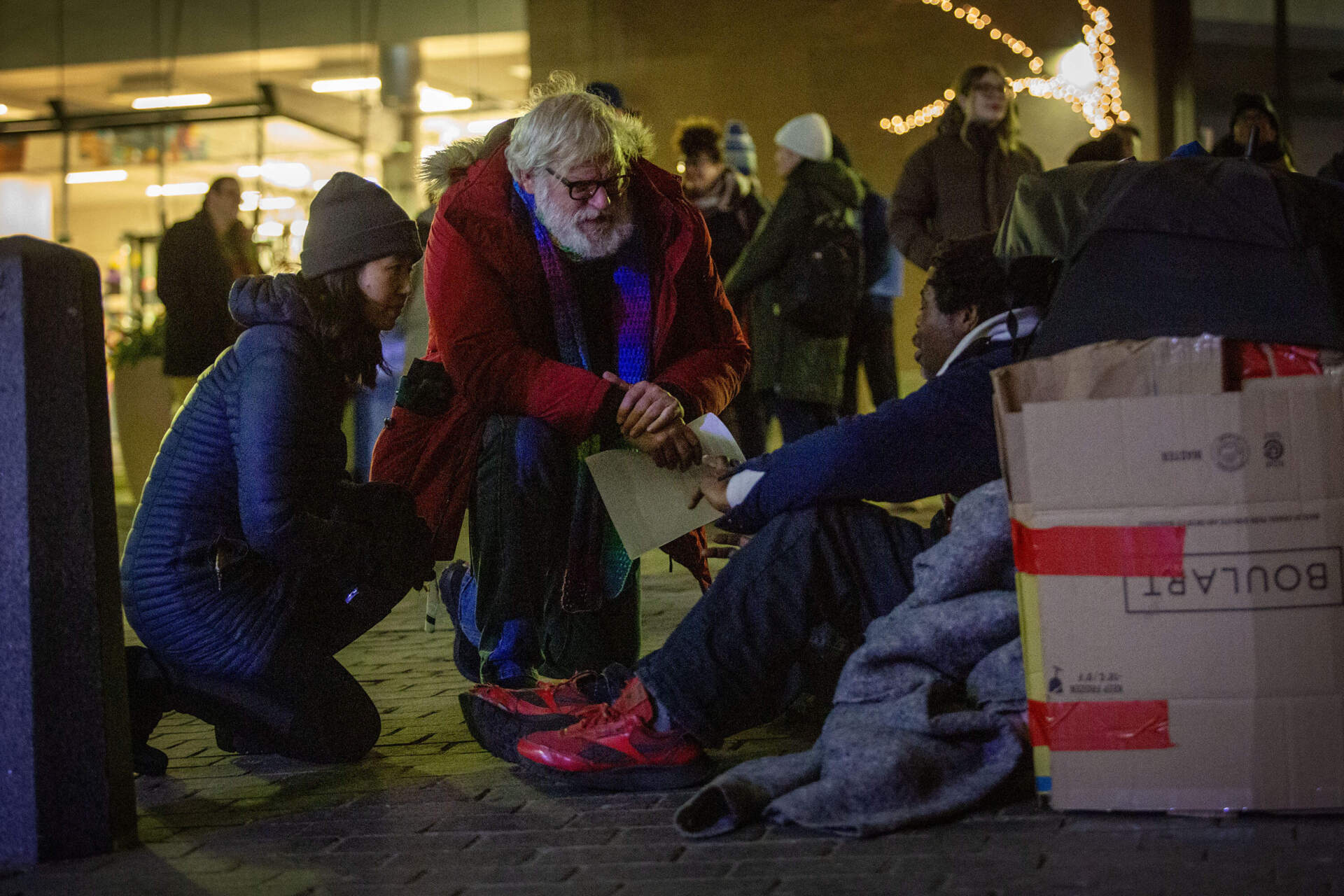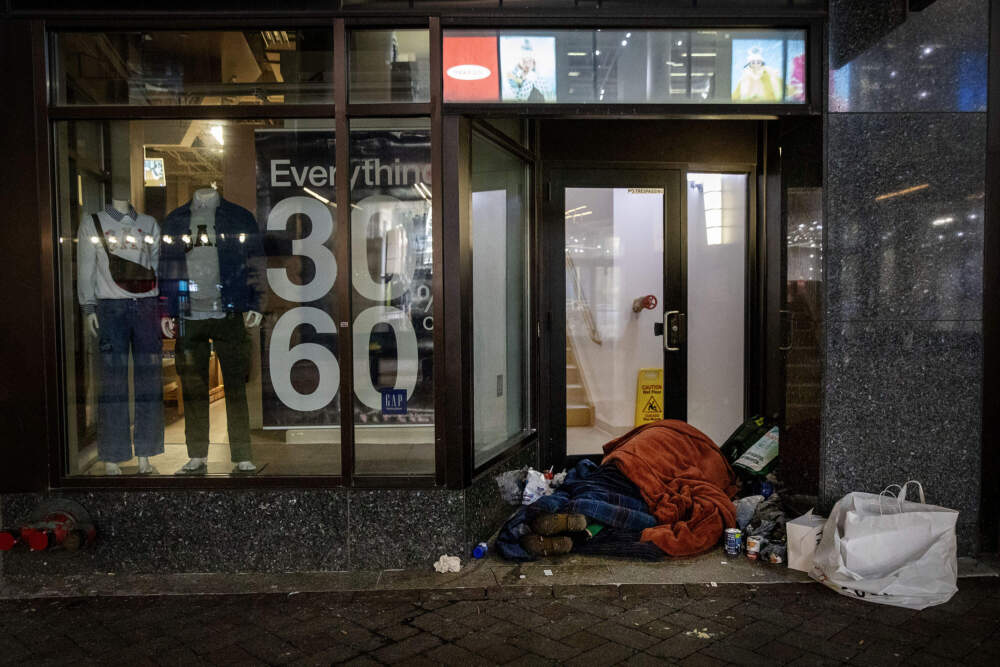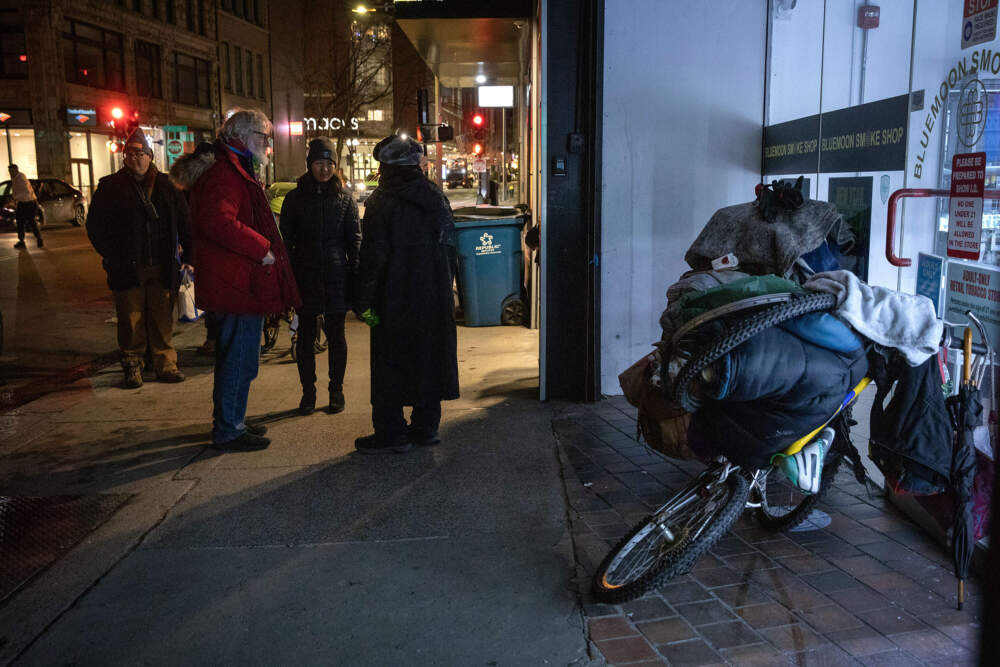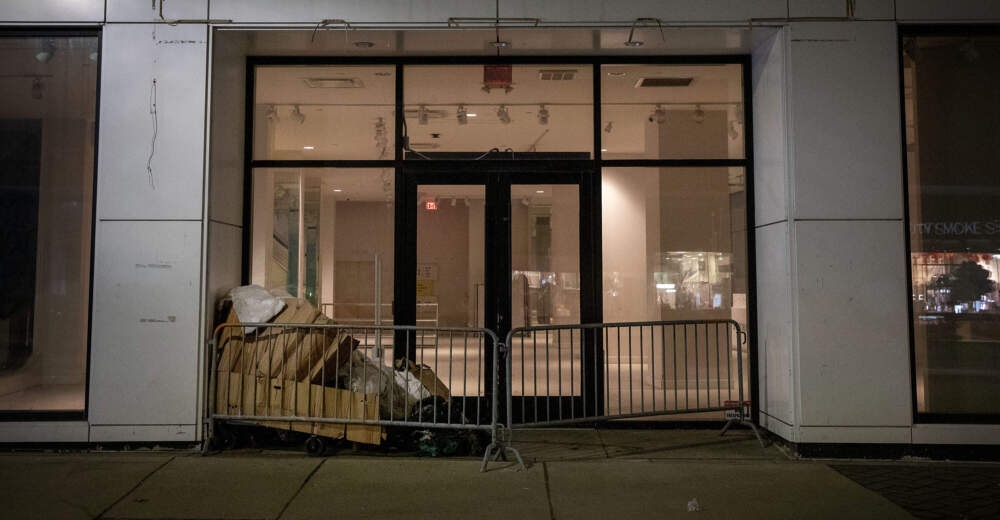Advertisement
City and nonprofit workers blanket Boston to conduct annual homeless census

It's almost midnight. The streets of downtown Boston are quiet. A team of about two dozen city officials and nonprofit leaders, including Mayor Michelle Wu, sets out from City Hall toward Downtown Crossing. Every block or two, they find a person in a doorway or under a box, covered by a couple of blankets or, in some cases, debris.
"Do you mind just touching base with a few questions to see if we can get you some help tonight?" Jim Greene, the city's assistant director for street homelessness initiatives, asks a man who's lying inside a box up against a wall of the Old State House.
The pair of city officials stoops down to see him. When Greene introduces Wu to the man, he eagerly says he'll stand up.
They're talking with him as part of the city's annual homeless census, which kicked off just before midnight Wednesday night and lasted into the wee hours of Thursday.
This time around, Greene says, 274 people have split up into groups to go to 45 different areas of the city. Those are places that have been known to have people staying outside or in abandoned buildings. The teams count unhoused people and collect demographic information from them when possible.
The first three people the downtown team came across had very different reasons for ending up on the streets.

"Somebody who's housed, whose tenancy became unstable and is threatened with eviction, who left [his apartment] ... so he's out on the street tonight," Greene recounts. "Someone else who has been homeless for ten years, had a traumatic brain injury and has lost his work in the building trades. And someone else who's just recently incarcerated and has been out for about three days... So... everybody's got a story."
Miguel Roman is sitting in a sleeping bag, behind a wall of boxes he neatly stacked in a doorway. He says he was released from prison last year, after serving 13 years. He got a job as a contractor and was living in a sober home. But then he lost his job and couldn't pay his rent, he says. The 59-year-old has been homeless since July.
Asked what the toughest aspects of living outside are, Roman says, "Being alone, cold and hungry sometimes, [staying] hydrated, you know. Lonely, nobody around. I heard people, like, [a] couple people got stabbed [around] here, couple weeks ago ... it's, you know, kind of scary."
Advertisement
The U.S. Department of Housing and Urban Development mandates an annual winter count of people staying in homeless shelters across the country, and it requires a count of the population on the streets every other year. Boston does both annually. The government uses the data from the census to direct anti-homelessness funding and programming.
In last year's census, the city found an increase in both people staying on the streets and those staying in shelters, amid a record-breaking rise in homelessness nationwide. As has traditionally been the case in Boston, the vast majority of the homeless population was found to be sheltered and about 3% of the population was not. That's despite the challenge of the tent encampment that grew in the city's "Mass. and Cass" area before it was cleared late last year.

One part of the large team that departed City Hall announces they're going to break off and head to another street in the area. Greene says that's a good idea.
"We want to cover all the nooks and crannies," he says.
The effort is not just about collecting data. The census teams offer assistance, including supplies or a ride from Pine Street Inn's outreach van. Jean Bouda is working on the van.
"[We're] taking people into the shelter. Whoever wants to go — it's voluntary," Bouda says. "And also, we're giving them, like, hot chocolate, water, and we have sandwiches, we have blankets and we have hand warmers."
Many of the people who are on the streets already have a case manager at a day shelter or other organization, according to Greene. But he and the other census workers say they'll help connect them with any other services they might need.
"The hope is that each of these conversations also leads to greater stability," says Wu.
That effort is up against a system that's under heavy strain. An influx of migrants has helped push the state-run family shelter system to the point of crisis. Shelters that serve solo adults, which are run by nonprofit organizations and Boston Public Health Commission, are also over capacity.
Wu says partnerships between the city and service organizations work well to help move people out of homelessness. Over the past two-and-a-half years, they housed more than 300 people who had been living on the streets.
"I mean, these are miraculous stories of finding stability, finding footing and moving from living on the street — faced with just about every challenge — to being self sufficient, working," she says.

There are people sleeping on the streets who might never reach that point, however.
"You know, to me, it's heartbreaking," Greene says of the people dealing with some of the most challenging issues. "It's... people with, you know, kind of persistent mental illness, who have difficulty trusting or tracking what's going on. People with substance use or medical disabilities, often co-occurring."
One woman isn't even visible when Greene and Wu stop to try to talk with her. She's under a big pile of cardboard and crumpled paper in a doorway. Greene knows her and says she suffers from severe mental illness, including a hoarding disorder. He notices her moving.
"Okay, well, I hope you hang in there," he says. "I don't want to stay here and, you know, bother you or upset you. But, um, any help we can be..."
She doesn't respond. But Greene and the local outreach teams will be back.
